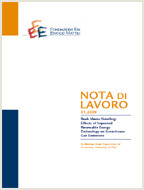Spatial Climate-Economic Models in the Design of Optimal Climate Policies across Locations

04.10.2012
William A. Brock, Gustav Engström, Anastasios Xepapadeas
Q54, Q58, R11
One-dimensional Energy Balance Model, Heat Transport, Latitudes, Temperature Distribution, Damage Distribution, Social Planner, Competitive Equilibrium, Local Welfare Weights, Optimal Taxes
Climate Change and Sustainable Development
Carlo Carraro
We couple a one-dimensional energy balance climate model with heat transportation across latitudes, with an economic growth model. We derive temperature and damage distributions across locations and optimal taxes on fossil fuels which, in contrast to zero-dimensional Integrated Assessment Models, account for cross latitude externalities. We analyse the impact of welfare weights on the spatial structure of optimal carbon taxes and identify conditions under which these taxes are spatially nonhomogeneous and are lower in latitudes with relatively lower per capita income populations. We show the way that heat transportation affects local economic variables and taxes, and locate sufficient conditions for optimal mitigation policies to have rapid ramp-up initially and then decrease over time.
